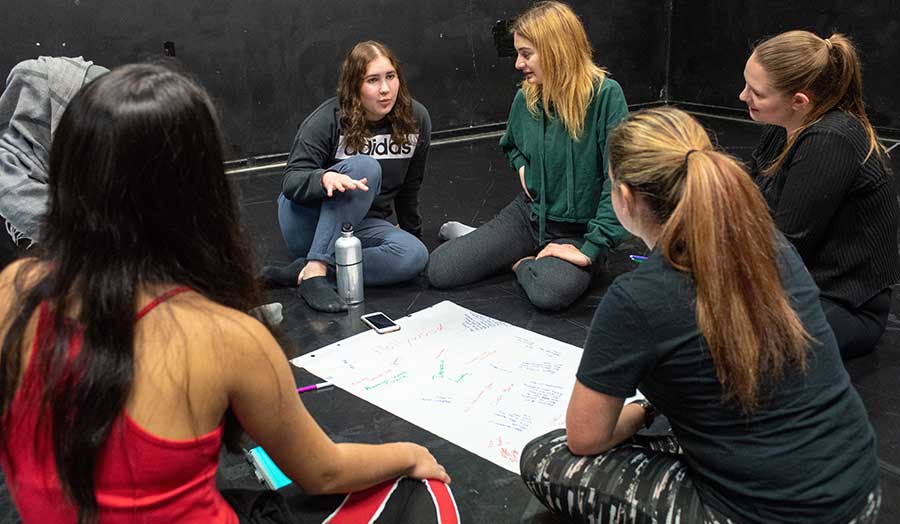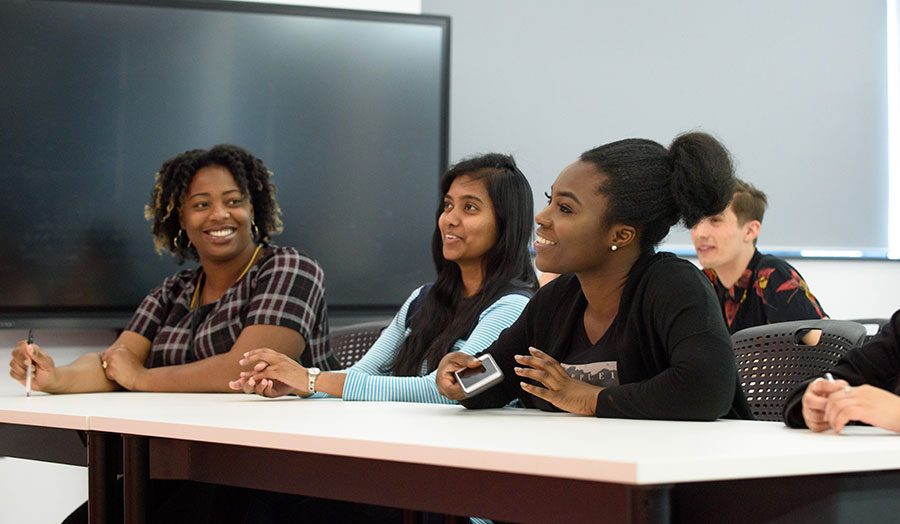

What to Include in Your PGCE Personal Statement
How your pgce personal statement should be structured, example personal statement, final thoughts, pgce personal statement.
Updated November 24, 2021

A PGCE personal statement is written as part of the application process for teacher training and gives candidates an opportunity to showcase their skills and attributes.
PGCE candidates will only write one personal statement, which is used to apply for all of their preferred choices. Students upload their personal statement to the UCAS Teacher Training system, and it is submitted for all choices in both phases of the application process (‘Apply 1’ and ‘Apply 2’). No changes can be made once it is submitted.
The personal statement is often used as the deciding factor for choosing whom to invite to interview . This piece of writing should explain the experience you have and how this translates into your abilities in the classroom.
It should also present what you might be like as a teacher – how will your personality and interests help engage students and get them enthused about the subject?
A lot is riding on your personal statement and writing it can be a daunting task. This guide will outline what your PGCE personal statement should contain and how to structure it for the best chance of success.
The admissions team will want to know about the skills, experience and personal qualities you have that would make you perfect for a teaching career. They need to see you have the dedication and passion to complete your PGCE and have a successful future.
Simply saying, “I would be good at this role and am well suited to it” isn’t enough. The PGCE provider needs to read real examples that demonstrate your skills and abilities and meet their requirements.

Here are some details you may want to include in your personal statement:
1. About You
A teacher’s personality and personal experience will be highly influential, therefore your own experiences are relevant to your application.
Before you start writing, it’s a good idea to spend a few minutes jotting down some key facts that are relevant to teaching. These might include:
- Your interests
- Qualifications/achievements
- What motivates you
- Your upbringing
- Relevant skills
Remember to include examples in your list. Coaching a sports team in your spare time suggests you are experienced in motivating young people and getting the best out of them. Maybe you play an instrument and use music in class. Including qualities like these will make your application stand out.
2. Why You Want to Teach
A key element of your application is explaining why you have chosen teaching as your future career. Show an awareness of how teachers can inspire individuals and also the benefits you might see in yourself.
Try to broaden your answer further than simply saying you are passionate about teaching or children. Every applicant will say they are passionate.
Give details of experiences that moved you towards this career or, perhaps, even the moment you realised this was what you were born to do. By using genuine examples, your passion and excitement will shine through.
3. Why You Are the Best Candidate
Try not to pull out a cliché like “I am passionate, dedicated and reliable” – make your application stand out by using a paragraph that the provider won’t see in any other application that day.
Think about what makes you different from any other candidate. Other applicants may say they can take charge of a class and have experience dealing with challenging children, but will they sing an entire lesson just to get the pupils to engage with them, like you did in your work experience? Or will they bring in a structure made out of Lego to demonstrate osmosis, like you did on your degree placement? Think of what makes you, you.
4. Why a PGCE?
Include details of why you have chosen to go down the route of a PGCE rather than doing a full teaching degree. Perhaps you dipped your toe into teaching while travelling after your degree and realised how much you love it, or maybe you are passionate about biology and wanted to decide at a later date whether to go into teaching or industry.
Show that you have done your research and understand the structure of the PGCE and what will be required.
5. Teaching-Related Experience
Include details of any experience you have gained working in schools or with children in another environment. This might include:
- Work experience
- Visits to schools
- Teaching assistant roles
- Voluntary teaching/supervision roles (like helping out at a scout hut, etc.)
- Experience via the Get School Experience service
- Classroom observations
With every experience you discuss, note the skills you gained and how they will benefit you as a teacher and how they have improved your understanding of the education system.
6. Other Professional Experience
Teaching demands a range of different skills – it’s not simply a case of delivering information.
Talk about past positions you have held:
- Did you manage people?
- Did you work within a team?
- Did you negotiate?
- Have you trained or coached others?
- When have you communicated information to different audiences?
The skills you have gained throughout your education, work and personal life can be highly relevant to your application. Be sure to include details of why these skills will make you excel as a teacher.
7. What You Learnt During Your Degree
Whether your degree was in the subject you intend to teach or not, it’s important to talk about the skills you developed throughout your learning and how they will benefit you as a teacher.
If you’re struggling to find transferable skills , here are some ideas:
- Think about how you communicated (presentations, critiquing the work of your peers, etc.)
- Give examples of how you organised yourself
- Describe times you helped others with their learning
Remember to talk about the benefits your initial degree will bring when studying for your PGCE and how your interest in it has inspired your desire to teach.
8. Your Knowledge of What Training to Be/Being a Teacher Entails
It’s important to stress your commitment to your training. To do this, you should demonstrate that you have done your research and are fully aware of what is to come.
Although teaching is a highly rewarding career, no one applying for teacher training will do so without being aware of the challenging nature of the profession.
There is no need to ignore these challenges in your application; actually, it will work in your favour if you show that you have thought about these challenges and are sufficiently prepared.
Talk about the positives and negatives that you expect to experience in your training and within your career, and how your core strengths will help you deal with them.
9. Your Future Plans
Discuss your plans beyond the PGCE:
- Do you have the ambition to be a headteacher?
- Do you plan to take on pastoral responsibilities?
Show a keenness to immerse yourself in the school system and be open to opportunities that come your way.
10. Extenuating Circumstances
Your personal statement is the place to openly discuss any extenuating circumstances, such as low grades or large gaps in employment/education. Make sure you show how you have overcome these challenges and what you learnt from them.

Write your personal statement in Word (or equivalent) and make sure you are happy with it before copying and pasting it into your application on the UCAS system.
You need to keep your personal statement to no more than 4,000 characters across a maximum of 47 lines of text . The UCAS Teacher Training system may differ slightly to your word processor, so be prepared to amend slightly once you have copied it into the UCAS page.
To keep to the character limit and cover all the suggested material above, you will need to be succinct. Make sure you only talk about topics that are relevant and delete any waffle.
Your opening statement should be strong and memorable – a good idea is to state why you have decided to get into teaching. Back up all details with examples and be sure to say what you learned from the experience or how you can bring the skills you developed into the classroom.
Split your statement into three sections:
- Introduction – Introduce yourself and talk about why you want to do a PGCE
- Middle – Use the notes above to cover the key details
- Conclusion – Tell the reader why you are the best person for the place they are offering
Avoid using bold, underlining or italics, and write in English (or Welsh if applying for Welsh PGCEs). The UCAS system will strip all special formatting out of the personal statement (except paragraph breaks) so ensure you keep it simple.
When you are happy with the content, make sure you ask someone to check your work . Spelling and grammar in personal statements should be accurate. Make sure you have not copied anyone else’s work at all – UCAS screens all applications for plagiarism.
Below is an example personal statement which covers all of the key points you should include in this piece of writing:
A teacher at my secondary school single-handedly transformed my passion and ability for maths; I was predicted an ‘F’ at GCSE and in a matter of months, she helped me achieve a ‘B’ and start to enjoy the subject. I can’t think of a more satisfying job than one in which you can inspire young people in the way my teacher inspired me. After achieving a ‘B’ in maths at A-Level, I went on to study the subject at University College London and graduated in 2018 with a 2.1. It was in the final year of my degree that I had my first taste of teaching the subject, as several of the modules involved presenting topics to large groups of first-year students. I was thrilled when students asked to see me afterwards to share their observations of what I had been discussing – it was clear my enthusiasm had rubbed off on them and they were excited by maths, which is exactly why I want to teach. I currently work as a teaching assistant at St Andrew’s School, where I have been for six months. This position has given me a great insight into the skills needed to be a fantastic teacher; the school has several SEN pupils and I have been exposed to the more challenging side of the profession. Being trusted to run activities with the entire class has helped me build confidence and learn how important it is to adapt lesson plans to engage students who have different abilities. I have gained valuable skills in implementing strategies such as gentle competitiveness between pupils, and tactical seating plans to get the best out of each student. Before working at St Andrew’s, I completed a work experience placement at Bell Lane Academy where I shadowed teachers working across the five different year groups. This experience helped hone my skills in addressing different age groups in different ways. My ability to get the best out of students is further strengthened by the experience I am currently gaining in the position of assistant coach at my local netball team. Having worked with the girls for the last 18 months, I have developed different ways of motivating individuals, helping push them outside of their comfort zones and encouraging them to take on new challenges. In my spare time, I enjoy playing netball and rugby and would be keen to take on extra responsibilities at a school in the form of after school clubs or teams. I also have a keen interest in management styles and personality types. The knowledge I gain from books on these topics helps me understand pupils and their differing learning styles – what works for them and what doesn’t. It also helps me look inwardly, analysing my own leadership style and methods of teaching. I have chosen to do a PGCE because I am passionate about maths, and I wanted to spend three years of a degree course exploring the subject further, rather than embarking on teacher training straight from school. My degree course has helped me with my confidence and my ability to speak in front of large groups of people. Teaching first-year students during my degree course helped me think about how to deliver the subject in an exciting and creative way. The experience I have had so far has clearly shown that teaching is an extremely challenging profession, but one which I believe is undeniably my calling in life. I adore maths and I want to bring the subject alive, helping children learn in an exciting, rewarding environment. A few weeks ago, I took it upon myself to ask the headteacher for permission to get the whole year group involved in a human percentages exercise – the children loved it. I believe I should be offered a place on your PGCE programme because I can commit to dedicating myself to a role in which I will strive to inspire and excite every pupil I teach.
The personal statement is your one opportunity to capture the attention of the PGCE provider and set yourself apart from other candidates. Teaching is about bringing your personality into the classroom and inspiring students, so avoid a formulaic application and speak from the heart, giving a full picture of who you are.
Your answers should convey enthusiasm for inspiring young people, a passion for teaching, creativity, excellent organisational skills and energy.
Demonstrate an awareness of this challenging profession but conclude with excitement and enthusiasm for your chosen career path.
You might also be interested in these other Wikijob articles:

Or explore the Postgraduate / Further Study sections.
Our cookies
We use cookies for three reasons: to give you the best experience on PGS, to make sure the PGS ads you see on other sites are relevant , and to measure website usage. Some of these cookies are necessary to help the site work properly and can’t be switched off. Cookies also support us to provide our services for free, and by click on “Accept” below, you are agreeing to our use of cookies .You can manage your preferences now or at any time.
Privacy overview
We use cookies, which are small text files placed on your computer, to allow the site to work for you, improve your user experience, to provide us with information about how our site is used, and to deliver personalised ads which help fund our work and deliver our service to you for free.
The information does not usually directly identify you, but it can give you a more personalised web experience.
You can accept all, or else manage cookies individually. However, blocking some types of cookies may affect your experience of the site and the services we are able to offer.
You can change your cookies preference at any time by visiting our Cookies Notice page. Please remember to clear your browsing data and cookies when you change your cookies preferences. This will remove all cookies previously placed on your browser.
For more detailed information about the cookies we use, or how to clear your browser cookies data see our Cookies Notice
Manage consent preferences
Strictly necessary cookies
These cookies are necessary for the website to function and cannot be switched off in our systems.
They are essential for you to browse the website and use its features.
You can set your browser to block or alert you about these cookies, but some parts of the site will not then work. We can’t identify you from these cookies.
Functional cookies
These help us personalise our sites for you by remembering your preferences and settings. They may be set by us or by third party providers, whose services we have added to our pages. If you do not allow these cookies, then these services may not function properly.
Performance cookies
These cookies allow us to count visits and see where our traffic comes from, so we can measure and improve the performance of our site. They help us to know which pages are popular and see how visitors move around the site. The cookies cannot directly identify any individual users.
If you do not allow these cookies we will not know when you have visited our site and will not be able to improve its performance for you.
Marketing cookies
These cookies may be set through our site by social media services or our advertising partners. Social media cookies enable you to share our content with your friends and networks. They can track your browser across other sites and build up a profile of your interests. If you do not allow these cookies you may not be able to see or use the content sharing tools.
Advertising cookies may be used to build a profile of your interests and show you relevant adverts on other sites. They do not store directly personal information, but work by uniquely identifying your browser and internet device. If you do not allow these cookies, you will still see ads, but they won’t be tailored to your interests.
How to write a PGCE personal statement
29 th September 2021

- Post on Facebook
- Send to a friend
- Recommend 0
Advice on how to write a PGCE personal statement that shows you’d make a great addition to a teacher training course.
What is a teacher training personal statement?
What to write, pgce personal statement tips.
When applying for a PGCE or postgraduate teacher training, you’ll probably have to write a personal statement. This is your chance to say why you’d make a great teacher by highlighting your relevant experiences and passion for teaching.
If you’re applying directly to a university or school, you should tailor your statement precisely to the course you’re applying for.
If you’re applying through UCAS Teacher Training, you can send your application to more than one university. Therefore, your statement should be more generic so that it applies to each one you’re applying to.
In both cases, make sure that your personal statement reflects the nature of the course or courses you’re applying for. Think about, for example, is it school- or university-based training? What age of students will you be teaching? Will you be specialising in a particular subject?
Before you start writing, look at any information you can find about the course and what you must do to apply. Has the university provided any guidance or topics of what you need to cover?
If not, can you speak to one of the course tutors to discuss what they might want to see in your statement? Or can you talk to a current PGCE student and ask what they wrote in theirs?
When you have a good idea of what admissions tutors will be looking for, create a mind map or list:
- Your relevant academic and practical experiences
- Areas of the course that you’re most interested in
- Anything else the university wants you to include
When structuring your statement, you can use your mind map or list to plan what information to put where.
Your structure can look something like:
- Introduction – about yourself and why you want to do the PGCE
- Middle paragraphs – relevant information of your academic achievements and experiences of working within education
- Concluding paragraph – tying up the main points of why you’re the best candidate for the course
If you’re applying directly to the university, check what the word limit for your personal statement is.
If you’re submitting to UCAS Teacher Training, your personal statement can be up to 47 lines of text or 4,000 characters.
Expanding on your mind map or list from before, think in more depth about why you want to teach.
- What qualities do you have that would make you good at teaching?
- What do you think are the challenges and benefits of being a teacher?
- Why have you chosen this particular age group and/or subject?
- What have you learned from your previous experiences in education?
- Will you be completing any extra exams or relevant experiences before the course starts?
If you studied education at undergraduate level, your course was probably focused on the theoretical side of the subject. Your PGCE course, however, will be about applying those theories to real-life situations in schools. Your personal statement should reflect your understanding of this.
If you haven’t taught before, what other activities or events in your life suggest that you would make a good teacher? Have you worked with children in different environments?
Admissions tutors don’t just want to see why you think your experiences make you a good teacher. Instead, they want to know that you’re aware of the importance of teaching and the demands that come with it.
- Why is it important to reflect on your abilities as a teaching practitioner?
- How will you work on your own development to become a great teacher?
- What interests you about the education system and its challenges?
- Do you have any thoughts are on child welfare and social justice?
When writing, make sure to use evidence and examples to back up your points. Through your tone of voice, try to show that you are positive and passionate about the work.
To see more information on how to style your personal statement, see our postgraduate statements guide.
- Ask someone you know to check it through. Even better if you can get feedback from a teacher
- See if you can speak to other students applying for a PGCE to share thoughts and ideas of what to write
- Similarly, reach out to PGCE staff at your university – or a teacher you know – they have experience that might be valuable to you!
- Any time you can spend in a school will be a valuable addition to your application. If you haven’t already, see if you can arrange to volunteer with one locally
- If you’re invited to an interview, you’ll be asked about what you’ve written on your statement, so be prepared to talk about it in more detail
DON'T MISS OUT
Receive regular newsletters packed with useful tips.
Converting a Postgraduate Certificate to a Masters
Certificates are a perfect stepping stone to a Masters degree as you’ll not only...
5 Reasons to do a Postgraduate Diploma
These days, many students wish to further their study after graduation. ...
Guide to the PGCE
A PGCE, short for Postgraduate Certificate in Education, is a higher-level postgraduate...
Similar articles and videos
Best universities for aeronautical and aerospace engineering, best universities for marketing, best universities for chemistry, best universities for sports science, don't miss out.
Suggestions in Courses
Suggestions in news.
- No suggestions found.
Suggestions in Events
Writing a pgce personal statement.
If you’re applying to train as a teacher you’ll be required to write a personal statement as part of your application.
Take your time writing your personal statement. It’s your first chance to make a good impression so it's well worth investing time to develop a clear structure and style of writing.
It’s a good idea to proofread your statement thoroughly and get others to read through and check for typos, grammatical errors, style, and tone.
What's the personal statement for?
The personal statement is crucial to your PGCE application; it is used primarily to decide whether to invite you for an interview. A poorly written personal statement could end your teaching career before it has started!
This is your chance to demonstrate what you have to offer as a teacher. You should also explain why you want to teach a particular subject or age range, and how your skills and experience will help you become a great teacher. It’s your chance to show your motivation, commitment and teaching potential and an opportunity to show your enthusiasm for teaching a particular subject or age group.
Remember, you only get one opportunity to write a personal statement for both cycles of applications, so it’s important to keep in mind that you should avoid creating tailored personal statements for each university.
How to write and structure your personal statement
The personal statement is split into two sections totalling a maximum of 1,000 words. It’s important to make sure you do not repeat yourself and to take time to ensure that each section is organised coherently. Divide your writing into paragraphs, each dealing with a particular aspect of the question.
Section 1: Why do you want to teach?
(Up to 600 words).
This is the place to talk about why you think you would make a great teacher. You can include:
- what has led you to choose teacher training
- your understanding of the demands and rewards of the PGCE course and of the teaching profession
- the personal qualities that will make you a valuable asset to a school
- details of any paid or unpaid experience you have of working with young people and what you learnt
- details of any other experiences which you can bring to the teaching profession. Think about any ‘transferable skills’ or qualities which you have developed which may be relevant to teaching.
- If you are a career-changer, what have you been doing and what are your reasons for the switch to teaching?
- your thoughts on children’s wellbeing and the education system
Your personal statement should tell us why you want to teach, your skills and about any experience you might have of working with young people or in the education sector. If you are taking any exams or additional study before starting the course, particularly if this relates to your eligibility to join the course, we want to hear about it.
It should also show that you understand the education system, what challenges teachers face and that you’re engaged with issues around education.
If you’ve not taught before, think about any other things you’ve done that might demonstrate the skills you’ll need to be a teacher (your transferable skills).
Although it’s a good place to expand on your skills and experience, this shouldn’t be the main focus of your personal statement as the rest of the application will showcase this.
Section 2: Why are you suited to teach your subjects or age group?
Up to 400 words.
Remember to not repeat anything you have already said in section 1!
If you’re writing a personal statement for secondary teacher training, use this section to describe your knowledge and experience of the subjects you’ve chosen. Any work experience in the field will be of interest.
What universities are looking for
Universities want to see your passion for teaching and understand why you think teaching this subject or age group is the right career for you.
Your personal statement should be original and honest. Try and avoid clichés or writing what you think we want to hear. All we really want to hear are the real reasons you’re applying to study a PGCE and become a teacher.
If you’re writing a personal statement for primary teacher training, say why you’d like to teach this age group. If you are particularly interested in certain primary subjects or have relevant experience in them, you can talk about that here too.
You could talk about:
- any relevant work or unpaid experience
- your degree and degree modules
- your other relevant qualifications, such as A levels
- any relevant skills, interests or achievements
- your understanding of the national curriculum
Questions your personal statement should answer
- Why do you want to be a teacher?
- Why do you want to teach a particular subject, Key Stage or age group?
- What are your strengths?
- What experience do you have and how has this influenced your desire to teach?
- What skills do you have that would be useful for teaching
The finer details
Your personal statement should be:
- no more than 1000 words
- written in the first-person
- grammatically correct - we suggest writing in a document before adding to your application
- your own work, don’t copy from anywhere online
- structured correctly with a clear introduction, evidenced paragraphs and a conclusion
- proof-read before being submitted
And finally, be prepared to answer questions about what you’ve written in your personal statement at the interview stage!
Find out more about how to get into teaching .
.jpg)
Find out more about how to get into teaching .
Follow us on social!
Facebook Instagram LinkedIn Twitter YouTube
Study a PGCE at London Met

PGCE Primary (3-7) - PGCE
Study this PGCE Primary course and become a qualified teacher of three to seven-year-olds.

PGCE Primary (5-11) - PGCE
Train to teach five to 11-year-olds on this PGCE course that leads to Qualified Teacher Status (QTS).

PGCE Secondary Computer Science with ICT - PGCE
Train to teach Computer Science with ICT to 11 to 16-year-olds and, by arrangement, 16 to 18-year-olds.

PGCE Secondary English with Drama - PGCE
This course will train you to teach English and Drama to 11 to 16-year-olds and, by arrangement, 16 to 18-year-olds.

PGCE Secondary English with Media - PGCE
Train to teach English and media to 11 to 16-year-olds and, by arrangement, 16 to 18-year-olds.

PGCE Secondary Mathematics - PGCE
Train to teach maths to 11 to 16-year-olds and, by arrangement, 16 to 18-year-olds. This course leads to Qualified Teacher Status (QTS).

PGCE Secondary Modern Languages - PGCE
Train to teach modern languages to 11 to 16-year-olds and, by arrangement, 16 to 18-year-olds with our PGCE course that leads to Qualified Teacher Status (QTS).

PGCE Secondary Science with Biology - PGCE
Train to teach science and biology to 11 to 16-year-olds and, by arrangement, 16 to 18-year-olds on this PGCE course that leads to Qualified Teacher Status (QTS).
PGCE Secondary Science with Chemistry - PGCE
Train to teach science and chemistry to 11 to 16-year-olds and, by arrangement, 16 to 18-year-olds. This PGCE course leads to Qualified Teacher Status (QTS).

PGCE Secondary Science with Physics - PGCE
Train to teach science and physics to 11 to 16-year-olds and, by arrangement, 16 to 18-year-olds on our PGCE course that leads to Qualified Teacher Status (QTS).
-(1).jpg)
Primary (7-11) (Key Stage 2) - PGCE
Train to teach seven to 11-year-olds on our specialist Key Stage 2 course, with Qualified Teacher Status (QTS).
More articles like this...
Checking your eligibility to study a pgce, how to prepare for your teacher training application, how to write a good personal statement for pgce application, what to expect at your pgce interview.
- Sign up for emails
- Find an event
Your teacher training personal statement
Your personal statement is your chance to make yourself memorable with teacher training providers and show them why you’ll make a great teacher.
You do not have to write it all at once – you can start it and come back to it. Successful candidates often take a few weeks to write their personal statements.
How long should my teacher training personal statement be?
Your personal statement can be up to 1000 words. 90% of successful candidates write 500 words or more.
You could include:
- skills you have that are relevant to teaching
- any experience of working with young people
- your understanding of why teaching is important
- your reasons for wanting to train to be a teacher
- any activities you’ve done that could be relevant to teaching (such as first aid courses, sports coaching or volunteering)
Teacher training providers want to see your passion and that you understand the bigger picture of teaching.
How to write your personal statement
When writing your personal statement you should make sure you check your spelling and grammar in your application. You want to make the best possible impression.
You can use ChatGPT or other artificial intelligence (AI) tools to help you write your personal statement. You should not rely on it to write your entire statement because:
AI tools use bland language and will not be able to give details about you as a person. Using them may result in your application being unsuccessful
your account to apply for teacher training may be blocked if you consistently submit personal statements that look like they have been written with AI tools
Do I use the same personal statement for each application?
You can use the same personal statement for every course you apply to.
However, there may be some instances where you’d like to tailor it to different courses.
For example, if you want to apply to train to teach maths and also to train to teach physics. In this case, you might want to change your personal statement to talk more specifically about the subject you’re applying to train to teach.
Should my personal statement be different if I’m training to teach primary or secondary?
You should use your personal statement to explain why you feel passionate about teaching a specific age range or subject.
If you’re applying for a primary course with a subject specialism, or you’re particularly interested in certain primary subjects, you can talk about that, too.
If you’re not sure if you want to teach primary or secondary, you can find out more about teaching different age groups .
Do I need school experience?
You do not need school experience to apply for teacher training, but it can help strengthen your personal statement.
Teacher training providers like to see that you have a good understanding of teaching, how the school system works and what your transferable skills are. You need more than just good subject knowledge and school experience can be a great way to get this.
Getting some school experience can also be a good way to make sure teaching is right for you before you apply for a course.
Find out how you could get school experience .
Get help with your personal statement
You can get help with your personal statement from our teacher training advisers . They have years of teaching experience and can give you free, one-to-one support by phone, text, or email.
Advisers can also help you understand more about what teaching is really like, which can help improve your application.
Start your application
Create an account and start your application for a teacher training course.
Apply for a course
Get free one-to-one support
Maximise your chances of submitting a successful application with the support of a dedicated adviser with years of teaching experience. Chat to an adviser through phone, text or email.
Chat online
Chat is closed
Chat not available Email: [email protected]
0800 389 2500
Call or chat to us Monday to Friday, 8:30am until 5:30pm , except on bank holidays (opens in new window) .
Whether it's just an idea or you're ready to apply, you could get personalised support from an adviser with years of teaching experience. Chat to them by phone, email or text as little or as often as you need.
We use cookies to collect information about how you use this website. We use this information to make the website work as well as possible, and improve this website. We also share some of this information with our social media, advertising and analytics partners.
Writing a Postgraduate Teacher Education personal statement
Updated on 7 July 2023
Guidance on how to write a PGDE/CE personal statement and an example to help demonstrate your skills, experience and motivation for teaching.
A personal statement is a short piece of writing (47 lines/4000 characters) which you are asked to submit in support of your application to study a PGDE/CE made through UCAS. It is your opportunity to demonstrate your skills, experience and motivation for teaching.
Before you start
Remember that this is a very important part of your application. Take your time to carefully plan out and practise your statement. It is a good idea to draft your statement in a word document and get some feedback on it before committing to the final version..
- Don't waste space with irrelevant or repetitive information. Be succinct and avoid complicated language and overly long sentences.
- Be specific about what you have to offer. Detail what you have gained from your experiences in schools/working with children. Give appropriate evidence of the skills you possess for teaching.
- Indicate the relevance of other types of experience or skills you possess, e.g. supervising people or sports
- Avoid using negative language. Present any gaps in skills or experience positively.
- Finish with a summary of what you have to offer leave the selectors with a clear understanding of your suitability for the course.
- Let your enthusiasm for teaching and working with children shine through in everything you say.
- Check grammar and spelling thoroughly! Do not rely on the spelling and grammar check on your word processing package alone. Ask someone to proof read it for you.
- If you are cutting and pasting from a word document, remember to check the formatting.
Questions to consider when structuring your Personal Statement
- Why do you want to be a teacher? - What has inspired you; who/what influenced you?
- Why do you want to work with young people? - What appeals to you about working with this age group; what skills do you possess that will help you?
- Why do you want to teach your subject? For primary: demonstrate a breadth of knowledge across a range of curriculum areas. For secondary, show how your subject knowledge is relevant to the curriculum.
- What have you gained from working with young people? - Have you had any experience in schools or working with children in other settings? Reflect upon what you did, what you observed, what you learned.
- What else can you offer? Skills in sports, music, languages, arts and crafts, ICT etc.
This is an example personal statement. There is considerable room for improvement and the notes make suggestions to help you with writing yours.
I am applying for the PGDE course because I have always wanted to be a teacher. I really like working with children and think that I have the right kinds of skills to become a good teacher .
- The above statement is far too short: you are allowed 47 lines/4000 characters so use them.
- Remember to specify whether you are applying f or primary or secondary courses.
- It is not enough to say that you have developed the "right kinds of skills". Be specific about them.
- It is important to have a strong opening statement . It is the first thing the selectors will read so you want to make an impact.
- Think about why you have always wanted to teach and clearly demonstrate.
New Paragraph
At school, I was involved with the Primary 1 class when I was in final year. I helped the less able children with reading on a one to one basis. I also help out at my local Brownie pack every week, keeping the girls busy with various activities. I have applied to do the Student Tutoring Scheme.
- When describing experience with children, make sure you are specific about what you learned from the work and the skills you developed.
- You need to demonstrate (by providing evidence) that you have developed/ have the potential to develop skills such as communication, leadership, teamwork, problem solving, organisation, planning and time management.
At school I studied a wide range of subjects but the one I enjoyed most was History so that is what I have studied at university. I also took Psychology and Politics in first year and Politics in second year too.
- When describing your studies, remember to show how this is relevant to the subject(s) you will be teaching.
I have been a babysitter for two children for several years and enjoy helping the older child with his homework now that he is at school.
- When describing your experience remember to demonstrate the transferable skills you have gained in this role that would be relevant to teaching. For example with babysitting you could link to the skill of 'behaviour management'.
I am very interested in education generally and keep up to date with current issues by reading the BBC website.
It is not enough to say that you 'keep up-to-date' here. Give a summary of what you have to offer and stating why you should be offered a place on the course.
Careers service
- Log in
- Site search
Teaching personal statement examples
Giving you the chance to show why you'd be a great teacher, your personal statement is an important part of your application and worth taking the time over
What is a teaching personal statement?
Your personal statement is used to explain why you want to become a teacher and your suitability for the role. While your application form briefly outlines your qualifications, skills and work experience, your teaching personal statement is where your personality shines through.
Take your time with it. Many candidates often spend a few weeks on this part of the application as you don't have to write it all at once. You should get someone to read over it and be prepared to receive constructive feedback and write a few drafts before you send it off.
It's important to:
- use examples based on your recent teaching experience
- tailor your personal statement according to the school/age group
- use good, clear, written English, using first person terms such as 'my' and 'I'
- be original and honest
- avoid clichés and general statements, such as 'I've always wanted to teach'
- demonstrate a passion for teaching.
While it's crucial to get it right, your teaching personal statement is only a small part of the application process. Find out how else you'll need to prepare to get a teaching job .
How to write a personal statement for teaching
Your personal statement should be between 500 and 1,000 words. It's crucial that you don't copy and that the statement you provide is your own work .
This is your opportunity to:
- write about any relevant skills and experience you have
- explain your understanding of why teaching is important
- detail why you want to become a teacher
- list any extra skills or experience you have, such as volunteering or first aid.
See personal statements for postgraduate applications for more guidance.
The nature of your personal statement will vary, depending on the type of teaching you'd like to pursue. Take a look at some of our example personal statements to get an idea of how they differ.
Personal statement for PGCE primary
As well as focusing on roles in which you've gained experience with primary-age children, a PGCE primary personal statement should demonstrate your well-rounded personality and any skills that could be useful for the range of extra-curricular activities primary schools provide (such as the ability to read music for recorder lessons, or drama experience to help with school plays).
Personal statement for PGCE secondary
Many good PGCE secondary personal statements acknowledge the challenges involved in teaching older pupils and provide examples of where the candidate has worked to overcome these problems. As secondary teaching roles are geared towards teaching a specific subject, training providers are looking for more evidence of your subject and degree knowledge.
Personal statement for School Direct
If you're applying for the salaried School Direct route, you should discuss the experience you've gained in the classroom prior to your application. One of your references will need to be from an employer, or someone who can comment on your work ethic and suitability for teaching. Don't worry if your degree is unrelated to the subject you'd like to teach - you may still be able to apply by completing a subject knowledge enhancement (SKE) course .
Find out more
- Discover how to structure a teaching CV .
- Find out what it's really like to be a primary or secondary school teacher .
- Search postgraduate courses in teaching .
How would you rate this page?
On a scale where 1 is dislike and 5 is like
- Dislike 1 unhappy-very
- Like 5 happy-very
Thank you for rating the page

- Careers Service
- Which career
- Jobs / experience
- Applications / interviews
- International
- CareerConnect
- Applications for further study
- Personal statement for teaching
- UCAS personal statement for medicine
Writing a personal statement for teacher training
These guidelines apply to applications for a PGCE or Schools Direct which are both made through Apply on the .Gov website
Include the following:
- Your reasons for teaching: Avoid clichés like, "I've always wanted to be a teacher".
- Choice of programme: Demonstrate that you have made a well-researched and informed choice. Show your knowledge of Initial Teacher Training providers.
- Knowledge and commitment to the age range you are applying for: If you are applying for both primary and secondary places in the same application, you need to make a strong case for your preferred option.
- Subject specific commitment: Subject tutors read the forms, so if you are applying for secondary it is important to mention this.
- Enthusiasm: Selectors look for clear-headed, informed enthusiasm. You need to demonstrate you understand the demands of the profession. Why would you be a good teacher?
- the national curriculum, national strategies and subject organisations eg The Association of Science Education
- classroom management (behaviour, groups, resources, timing and pastoral care)
- teachers roles and responsibilities
- classroom organisation
- differentiation- special education needs (SEN)
- the role of ICT
- assessment for learning
- awareness of possible gaps - eg if you have a C grade in English and are applying for primary, you need to show that you are willing to polish up
- Mention any geographical restrictions you have, as these may be taken into account.
- Get advice on your personal statement
- Information on routes into teaching
Further advice
- From the Department for Education
- Target Jobs advice on writing your personal statement
- Getting in touch
Careers Service, The University of Manchester
Connect with us
- Copyright notice
- Accessibility
- Freedom of information
- Charitable status
- Royal charter number: RC000797

PGCE Personal Statement Examples
- 1 Personal Statement Example Links
- 2 Career Opportunities
- 3 UK Admission Requirements
- 4 UK Earnings Potential For PGCEs
- 5 Similar Courses in UK
- 6 UK Curriculum
- 7 Alumni Network
Personal Statement Example Links
- Personal Statement Example 1
- Personal Statement Example 2
- Personal Statement Example 3
- Personal Statement Example 4
Ever been inspired by the idea of shaping young minds and making a lasting impact on learners’ lives? Intrigued by the prospect of transitioning into the rewarding world of teaching?
If so, embarking on a PGCE – Postgraduate Certificate in Education , could be your ideal journey. This critical educational qualification equips you with the skills and knowledge to transform your passion into a teaching profession.
A PGCE (Postgraduate Certificate in Education) is a postgraduate qualification that allows you to teach in the UK. It is a highly sought after qualification and is essential for anyone wishing to pursue a career in teaching.
The PGCE course is an interesting and relevant choice for students as it offers them the chance to learn from experienced professionals and gain valuable insight into the teaching profession. It also provides an opportunity to develop their own teaching style and gain an understanding of the educational system. The course is also highly relevant for those looking to pursue a career in teaching, as it provides them with the necessary qualifications and skills to be successful in the profession.
👍 When writing a personal statement : Highlight your passion for the course, demonstrating your understanding of it. Use relevant personal experiences, coursework, or work history to showcase how these have fostered your interest and readiness for the course.
Career Opportunities
A PGCE (Postgraduate Certificate in Education) is a qualification that enables someone to become a qualified teacher in the UK. With this qualification, graduates can pursue a career in teaching in both state and private schools, as well as in further education colleges.
In addition to teaching, a PGCE can open up a range of other career opportunities. Graduates can pursue roles in the education sector, such as educational psychologists, school counsellors, learning support assistants, special educational needs coordinators, and school governors. They can also pursue roles in the wider public sector, such as policy makers, educational consultants, and lecturers in universities.
Those with a PGCE can also pursue careers in the private sector. They can become educational consultants, working with businesses and organisations to develop training programmes and learning materials. They can also work in the publishing industry, developing educational materials for schools and universities.
Finally, PGCE graduates can also pursue roles in the charity sector. They can work in charities that focus on education, such as those that provide educational opportunities for disadvantaged children, or those that promote educational research. They can also work in charities that focus on other areas, such as health or the environment, using their skills and knowledge to develop educational materials and programmes.
UK Admission Requirements
The entry requirements for the PGCE course vary depending on the institution, but typically require a minimum of a 2:1 degree in a related subject, or a 2:2 degree with additional experience or qualifications.
In addition to the degree requirements, applicants must also have a minimum of 5 GCSEs at grade C or above, including English, Maths and Science.
Applicants must also have a satisfactory enhanced Disclosure and Barring Service (DBS) check.
The entry criteria for the PGCE course is similar to other courses in the same field, such as the Postgraduate Certificate in Education (PGCE). However, the PGCE course does require a higher degree classification than the PGCE.
In addition, the PGCE course requires applicants to have a minimum of 5 GCSEs at grade C or above, whereas the PGCE does not have this requirement.
Finally, the PGCE course requires applicants to have a satisfactory enhanced Disclosure and Barring Service (DBS) check, whereas the PGCE does not have this requirement.
UK Earnings Potential For PGCEs
The average earnings for someone with a PGCE will depend on the type of job they are able to secure. Generally, those with a PGCE can expect to earn between £25,000 and £45,000 per year, depending on their experience and the job they are able to secure.
The job market for those with a PGCE is very competitive, and there is a growing demand for teachers with a PGCE in the UK. Salaries for teachers with a PGCE have been rising over the past few years, and this trend is expected to continue. Additionally, those with a PGCE may be able to find higher paying jobs in the private sector, such as teaching in private schools or working as a private tutor.
Similar Courses in UK
Other university courses related to the PGCE course are the following Postgraduate Certificate in Education (PGCE) Secondary, the Postgraduate Certificate in Education (PGCE) Primary, the Postgraduate Certificate in Education (PGCE) Further Education and Training, and the Postgraduate Certificate in Education (PGCE) Special Educational Needs and Inclusion.
The key differences between these courses are the age range of the students they are designed to teach. The PGCE Secondary is designed to teach students aged 11-18, the PGCE Primary is designed to teach students aged 4-11, the PGCE Further Education and Training is designed to teach post-16 students, and the PGCE Special Educational Needs and Inclusion is designed to teach students with special educational needs and disabilities.
Additionally, the PGCE courses all have different entry requirements, such as a degree in a relevant subject, teaching experience, and a satisfactory Disclosure and Barring Service (DBS) check.
UK Curriculum
The PGCE course covers a range of topics and modules related to teaching and learning. These include:
- Professionalism and Professional Learning: This module focuses on the development of professional values and attitudes, as well as the development of professional learning. It also covers the development of professional relationships with colleagues, students and parents.
- Curriculum and Pedagogy: This module focuses on the development of curriculum knowledge and understanding, as well as the development of pedagogical approaches to teaching and learning. It also covers the development of curriculum planning and assessment.
- Educational Technology: This module focuses on the use of technology in teaching and learning, as well as the development of digital literacy skills. It also covers the use of digital tools in teaching and learning.
- Special Educational Needs: This module focuses on the development of an understanding of special educational needs and the development of strategies to support learners with special educational needs.
- Inclusion and Diversity: This module focuses on the development of an understanding of inclusion and diversity in education, as well as the development of strategies to support learners from diverse backgrounds.
- Assessment and Evaluation: This module focuses on the development of an understanding of assessment and evaluation in education, as well as the development of strategies to support learners in assessment and evaluation.
The PGCE course also includes hands-on experience and practical work. This includes classroom observation, teaching practice, and the development of teaching resources.
Alumni Network
Notable alumni from the PGCE course include Professor Simon Peyton Jones , a computer scientist and researcher at Microsoft Research in Cambridge, UK. He is a Fellow of the Royal Society, a Fellow of the British Computer Society, and a Fellow of the Association for Computing Machinery.
Professor Peyton Jones is well known for his work on the Haskell programming language and for his contributions to the development of functional programming. He has also written several books on the subject of functional programming, including “Programming in Haskell” and “The Implementation of Functional Programming Languages”.
The University of Cambridge offers a number of alumni events and networking opportunities for PGCE graduates. These include the Cambridge Alumni Network, which is an online platform for alumni to connect with each other, share ideas and resources, and stay up to date with the latest news from the university.
Additionally, the university hosts a number of alumni events throughout the year, such as the Cambridge Alumni Festival, which is an annual event held in the summer. This event includes lectures, panel discussions, and networking opportunities with alumni and faculty members.
Reach out to us for career and sponsorship opportunities
© 2024 Acrosophy Excellence in Application
A Medical MBA Company The Medical MBA Ltd Company number: 13561401 86-90 Paul Street, London, England, United Kingdom, EC2A 4NE
- AI Content Shield
- AI KW Research
- AI Assistant
- SEO Optimizer
- AI KW Clustering
- Customer reviews
- The NLO Revolution
- Press Center
- Help Center
- Content Resources
- Facebook Group

Key Tips for Writing Creative PGCE Personal Statements
Table of Contents
As a teacher in training, one of the most important things you’ll need to do is write a personal statement for your PGCE application.
The personal statement for PGCE application is your chance to shine and show off why you’d be perfect for the teaching profession. However, with so many other candidates vying for a place on these courses, how can you ensure that your personal statement stands out?
This article will help you do just that with the amazing tips therein.
How to Write a Great Personal Statement for PGCE Application
A great personal statement for PGCE application won’t appear from anywhere. There’s a method to it. Check out these tips to help you get started.
Introduction
The first paragraph of your personal statement should introduce you and your motivation for applying. Why teaching? What interests you about it? Is it the idea of entering a profession that will give you the freedom to know your own hours and lifestyle? Perhaps it is the personal connections you will make with students and the positive impact you will have on them.
Highlight Your Experience
Your subsequent paragraph should talk about any relevant experience that you have. The experience could be working with children or young adults in a school setting or engaging in informal tutoring. How has this prepared you to be a teacher?
Highlight Your Academic Achievement and Skills
You should highlight any areas of academic excellence or special skills that could make you an asset in the classroom. The skills could include strong literacy skills and experience using technology.
Discuss How Teaching Aligns With Your Values
Another way of showing the admission officers that you are worthy of a place is to show that teaching aligns with your personal values. In essence, you should show that you’re passionate about teaching.
Examples of Personal Statements for PGCE Application

Check these examples of personal statements for PGCE applications generated using the Hey INK tool. You can also create your personal statements faster using the tool.
I am a graduate of Oxford University, and I have always been passionate about teaching. In fact, while studying for my degree, I volunteered as a tutor at the local library. My experience there showed me that I love working with kids and helping them learn.
Since graduating, I have worked as an elementary school teacher in [city/state]. It has been an amazing experience and one that has helped me develop skills such as patience and creativity. The most rewarding part of the job is seeing children’s faces light up when they finally understand what we are discussing in class. It really makes all the hard work worth it!
Now that I have several years of teaching under my belt, I feel ready to take on another challenge: becoming a PGCE student. This program will allow me to deepen my knowledge of education theory whilst also getting practical training in the classroom. Ultimately, my goal is to become an outstanding educator who can make a real difference in students’ lives.
I am an aspiring teacher who is passionate about working with children. I’ve been in various teaching roles over the past few years. And I have found that nothing gives me more satisfaction than helping students learn and grow. I believe every child has potential, and I aim to help them unlock it.
My experience as a teacher includes working with kids of all ages, from preschool through high school. In each role, I have tried to emphasize learning through play and exploration while also providing support for students who need additional assistance. My own education has given me strong foundational knowledge in both math and science, subjects which are often required by most PGCE programs. Additionally, I have volunteered extensively with local schools and charity organizations. So I understand the importance of being part of the young members of a community.
A personal statement is an important piece of writing you should pour all of your heart into. The tips in this article help you write better statements that can get you ahead . Now that you have the knowledge necessary to write a better personal statement get it done and start preparing for your application process!

Abir Ghenaiet
Abir is a data analyst and researcher. Among her interests are artificial intelligence, machine learning, and natural language processing. As a humanitarian and educator, she actively supports women in tech and promotes diversity.
Explore All Write Personal Statement Articles
How to draft meaningful length of law school personal statement.
Are you confused on how to write a law school personal statement? One of the essential elements of your application…
- Write Personal Statement
Effective History and International Relations Personal Statement to Try
Are you considering studying history and international relations? Or you may be curious about what a degree in this field…
Guide to Quality Global Management Personal Statement
Are you applying for a global management program and want to stand out from the crowd? A well-written personal statement…
How to Draft Better Examples of Personal Statements for Residency
Achieving a residency can be a massive accomplishment for any aspiring medical professional. To secure your spot in one of…
Tips for Drafting a Free Example of Personal History Statement
A personal history statement can be crucial to many applications, from university admissions to job search processes. This blog will…
Writing Compelling Dietetic Internship Personal Statement
Applying for a dietetic internship is a rigorous process and requires submitting a personal statement, which is an essential part…
Clearing Universities & Courses
Clearing advice.
Recommended Clearing Universities
Popular Course Categories
Course search & discover.
Start the search for your uni. Filter from hundreds of universities based on your preferences.
Search by Type
Search by region.
Recommended Universities

Ravensbourne University London
London (Greater) · 88% Recommended
.jpg)
The University of Law
London (Greater) · 92% Recommended

City, University of London
Search open days.
What's new at Uni Compare

University of Sunderland
Unlock your potential at one of the world’s best young universities (THE, 2023).

Staffordshire University
Apply to the uni ranked 2nd for quality teaching (THE, 23).
Ranking Categories
Regional rankings.
More Rankings
Top 100 Universities
Taken from 65,000+ data points from students attending university to help future generations
About our Rankings
Discover university rankings devised from data collected from current students.
Guide Categories
Advice categories, recommended articles, popular statement examples, statement advice.

What to include in a Personal Statement

Personal Statement Tips
Personal statement example physical education personal statement.
Submitted by Ellie
Physical Education Personal Statement
An active lifestyle has fuelled my passion for Physical Education (PE). Physical activity has played a large part in my life from dancing to competitive swimming I have always enjoyed taking part in sport and the feeling of well-being it brings.
Since starting high school it's been my ambition to become a PE Teacher. I enjoy working with people, encouraging them to participate in physical activity helping to promote a sense of confidence, well-being and achievement. To help achieve my ambition I have sought to learn as much as I can about sports coaching both academically and practically; taking a Higher in PE and taking part in activities to help to build leadership, life and technical skills. I volunteered at my local YMCA from age 13 to 16. As a Youth Worker I ran the gym for young people (aged 12 to 18) providing inductions, demonstrations and developing personal fitness plans. I've run drop-in sessions providing counselling and support helping young people with some of the issues they faced in their day-to-day lives. For my work I was awarded the Saltire Award from John Swinney MSP for 500 hours volunteering. I coach Netball for 1st to 5th Year after school as well a running the Basketball club during lunchtime, whilst this is done in my own time it is very rewarding. I am also an Active Schools Young Sport Ambassador for my school, specialising in Basketball. The Young Ambassadors programme has led to me attaining qualifications in First Aid, Disability Inclusion Training, Young Sports Leaders and Child Protection. I have been trained to handle the day to day situations I may find myself in when I am working in schools as a coach. I have experience in promoting sports and awareness as part of community charity work. I organised a netball match between pupils and teachers for the benefit of St. Andrews Hospice (one of our school charities I am an ambassador for). This was a great event promoting awareness of netball, our school team; whilst raising funds for a very worthwhile cause.
This year I have had the opportunity to take 1st and 2nd Year PE classes each week. This has allowed me to put into action the skills and experiences I have in the environment I want to work in - a high school sports department, planning and delivering lessons. I have also worked with local primary schools as an Active Schools Co-ordinator to organise sports coaching sessions for the pupils. These experiences were quite different and have provided great insight and learning experiences. They have reinforced the passion I have to work with young people. I am a school Prefect taking a lead in school activities, acting as a role model for the other pupils in the school. This role brings a lot of responsibility and allows me to provide and demonstrate leadership in a variety of situations.
Outside of school my hobbies are physical fitness and music - playing both the guitar and bagpipes. I have had the privilege of being part of the North Lanarkshire Schools Pipe Band and playing at the Royal Concert Hall in Glasgow and taking part in the World Pipe Band Championship (achieving a first place for our grade). I also work part-time for Greggs. Working in a fast paced retail environment over the past year has helped me to develop good organisational skills, work with others to achieve goals and develop my customer service skills (I have won several mystery shopper awards for my work).
In conclusion I am confident and hard-working individual. I have worked hard to amass the academic, technical and life skills to achieve my ambition to attend University and get the opportunity to pursue my ambition to teach PE. I believe I have both the attitude and aptitude to thrive in a vibrant university environment.
Want to learn more about a university?
Get your questions answered by sending them an enquiry now.
undergraduate Universities
Undergraduate uni's.

Ravensbourne
.jpg)
246 courses

Goldsmiths, UOL
272 courses

Uni of Surrey
437 courses

ARU Writtle
103 courses

West London IoT

Uni of Sunderland
200 courses

Uni of East London
299 courses

Leeds Arts University

Kingston Uni
386 courses

Uni of Chester
402 courses

Cardiff Met Uni
304 courses

Northeastern Uni

Uni of Winchester
166 courses

Uni of Hertfordshire
418 courses

Uni of Suffolk
106 courses

528 courses

Uni of Bradford
197 courses

Uni of Bedfordshire
343 courses

Uni for Creative Arts
323 courses

Coventry Uni
446 courses

Leeds Beckett Uni
325 courses

Staffordshire Uni
276 courses

Heriot-Watt Uni
207 courses

Uni of Leicester
267 courses

Anglia Ruskin Uni
463 courses

Uni of Westminster
331 courses

Uni of Essex
802 courses
,-Bristol.jpg)
UWE, Bristol
250 courses

Wrexham Uni
168 courses

Uni of C.Lancashire
440 courses

Uni of Kent
429 courses

Uni of Roehampton
270 courses

Middlesex Uni
313 courses

238 courses

Uni of Reading
393 courses

415 courses

Swansea Uni
782 courses

Escape Studios

365 courses

Uni of Huddersfield
453 courses

Uni of Brighton
252 courses

Bath Spa Uni
295 courses

Edge Hill Uni
245 courses

Uni of Portsmouth
370 courses

Uni of Hull
273 courses

Nottingham Trent
531 courses

Edinburgh Napier
184 courses

Queen's Uni
410 courses
Find the latest from Uni Compare

Bath Spa University
Pick Bath Spa, awarded the Uni of the Year for Social Inclusion!

University of East London
The University of East London has been shortlisted as the Uni of the Year! (THE 2023)

IMAGES
VIDEO
COMMENTS
How to write it. You can use up to 47 lines of text (4,000 characters) in your personal statement. Some word processing packages calculate line counts differently from the UCAS Teacher Training system, so you might need to redraft your statement if there's a discrepancy between the counts. Write in English (or Welsh if you're applying to ...
A PGCE personal statement is written as part of the application process for teacher training and gives candidates an opportunity to showcase their skills and attributes.. PGCE candidates will only write one personal statement, which is used to apply for all of their preferred choices. Students upload their personal statement to the UCAS Teacher Training system, and it is submitted for all ...
Your structure can look something like: Introduction - about yourself and why you want to do the PGCE. Middle paragraphs - relevant information of your academic achievements and experiences of working within education. Concluding paragraph - tying up the main points of why you're the best candidate for the course.
Your personal statement should be: no more than 1000 words. written in the first-person. grammatically correct - we suggest writing in a document before adding to your application. your own work, don't copy from anywhere online. structured correctly with a clear introduction, evidenced paragraphs and a conclusion.
Example personal statement for PGCE secondary. I became interested in teaching after realising how much I had benefited from excellent and passionate teachers. They exuded a real sense of enthusiasm for learning, which inspires me to pass on that passion. My love for computing developed during my A-levels after discovering an aptitude for ...
Your personal statement can be up to 1000 words. 90% of successful candidates write 500 words or more. You could include: skills you have that are relevant to teaching. any experience of working with young people. your understanding of why teaching is important. your reasons for wanting to train to be a teacher.
Example personal statement for PGCE primary. In my early education, reading and writing were a challenge. At age nine I received a diagnosis of dyslexia bringing with it extra support from the school. This gave me a real determination to overcome my disability. It drove me to study hard, achieve high GCSE and A-level grades and go on to achieve ...
Clare talks to us about how to write a successful PGCE personal statement. The video will cover the process on applying, show two statement examples and prov...
Stick to word limits (if given) and in most cases you should be able to say what you need to say on one side of A4. Keep the language simple and clear so it is easy to read whilst still being professional. Be positive and show enthusiasm for the subject. Within the main body of the statement you should aim to cover:
A personal statement is a short piece of writing (47 lines/4000 characters) which you are asked to submit in support of your application to study a PGDE/CE made through UCAS. It is your opportunity to demonstrate your skills, experience and motivation for teaching. Before you start. Remember that this is a very important part of your application.
Here are some key skills to mention when writing your PGCE personal statement: Training and coaching experience. Direct contact and engagement with children. Communication with a range of audiences. IT and computer literacy. Flexibility and accountability.
How to write a personal statement for teaching. ... a PGCE primary personal statement should demonstrate your well-rounded personality and any skills that could be useful for the range of extra-curricular activities primary schools provide (such as the ability to read music for recorder lessons, or drama experience to help with school plays). ...
Writing a personal statement for teacher training. These guidelines apply to applications for a PGCE or Schools Direct which are both made through Apply on the .Gov website. Your reasons for teaching: Avoid clichés like, "I've always wanted to be a teacher". Choice of programme: Demonstrate that you have made a well-researched and informed choice.
PGCE Personal Statement Sample. Learning is natural, necessary and nurtured aspect of life. Being a teacher will allow me to become an important figure in this process, where I endeavour to impart knowledge, expand perceptions and provide life tools during a critical stage in development. Work experience, interpersonal skills and a solid ...
UK Earnings Potential For PGCEs. The average earnings for someone with a PGCE will depend on the type of job they are able to secure. Generally, those with a PGCE can expect to earn between £25,000 and £45,000 per year, depending on their experience and the job they are able to secure.
This PGCE personal statement examples resource is perfect to help anyone when it comes to writing their statements. This document has a wealth of information that will guide you through a process that can be difficult at times. It includes: Knowledge and interest in the subject area. Suitability for the course.
Your Personal Statement should: be persuasive. be fluent, realistic, relevant and specific. mention young people- it is about enabling them to learn rather than why you want to teach. be honest. Avoid: overuse of short sentences all beginning with 'I'. general statements and narrative.
Template 1. Template 2. Conclusion. As a teacher in training, one of the most important things you'll need to do is write a personal statement for your PGCE application. The personal statement for PGCE application is your chance to shine and show off why you'd be perfect for the teaching profession. However, with so many other candidates ...
PGCE Personal Statement Writing Services. Our company is the UK's leader when it comes to writing and editing bespoke UCAS personal statements for undergraduate and postgraduate courses. Our staff are exceptional writers and education experts, with decades of combined experience in writing unique professional statements on behalf of ...
Here are some key skills to mention when writing your PGCE personal statement: Management skills. Organisational skills. Teamwork skills. Training and coaching experience. Direct contact and engagement with children. Communication with a range of audiences. IT and computer literacy.
#PersonalStatement #Teaching #TeacherTraining #PGCE #PGCEPrimaryHello!I'm a first class Masters graduate and a Teaching Assistant applying for a PGCE in Prim...
Physical Education Personal Statement. An active lifestyle has fuelled my passion for Physical Education (PE). Physical activity has played a large part in my life from dancing to competitive swimming I have always enjoyed taking part in sport and the feeling of well-being it brings. Since starting high school it's been my ambition to become a ...
A resume personal statement should include: Between 50 and 200 words in 3 - 4 sentences. Your title or function, for example "Junior developer" or "Passionate hospitality manager". An opening hook. Soft skills and hard skills. Impressive facts and stats. Your short and/or long-term goals.